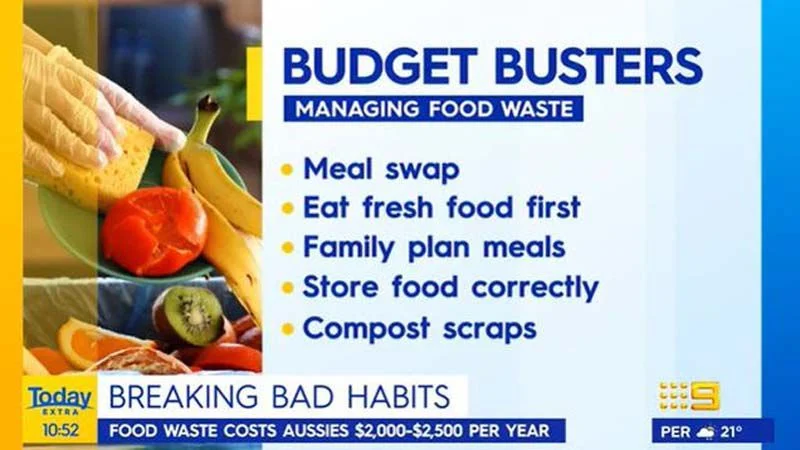![[feature] Common Causes of 'Budget Leakage'](https://blogger.googleusercontent.com/img/b/R29vZ2xl/AVvXsEgcGL4aN-F99tjRzW0RkaEHzGu1ldxOzE1vxYhzigOTkepIFSA5ahwXBxrDIZ8qoddwhaZGWing0XtopLgaXR1C5pgiEk05Zhgc3cDR9bNsw73Do7mTfGrSF-y3yvbEW0YkPMTbxkiTDK4Tb49EBSkSUGmpnGdYGtG05m6lYvJHgdTU1Q8Wi46ICO1o/s16000-rw/spending-habits.jpg) |
| Australia's inflation rate has just recorded it's largest quarterly and annual increase. Ⓒ Provided by 9Honey |
By Jo Abi, 9Honey
Australia's inflation rate has just recorded its largest quarterly and annual increase since the introduction of the GST in 2000.
That means we are all getting much less bang for our bucks, particularly when it comes to petrol and groceries.
Here at 9Honey we are always on the lookout for tips and tricks to help families stretch their dollars further, and it's all about changing your everyday habits and keeping a close eye on your back accounts.
We've identified five of the most common causes of 'budget leakage' – those habits that can further impact the family budget – and have come up with some simple tricks to help stop them.
1. Subscriptions
 |
| Subscriptions often take money out of our budgets and add up to a huge chunk of change. Ⓒ Provided by 9Honey |
There are so many subscription services, but nobody needs all of them. There are streaming services, children's websites, our own subscriptions... and it all adds up.
What to do about this:
* Look through your spending account each month and check all the subscription payments.
* Cancel any services you no longer use. You can also start them up at a later stage.
* Dispute any payments you don't know the source of with your bank.
* Cancel or temporarily block your card attached to these payments until you sort them out. This won't affect your credit rating – just sign back up to the ones you want. A good way to get rid of ones you have forgotten about or no longer use.
2. Unplanned spending
 |
| Oftentimes it's lots of little bad habits that prove to be our undoing when it comes to budgets Ⓒ Provided by 9Honey |
Shopping can be fun, but we often pay for products and services we don't really need.
What to do about this:
* Attempt a 'spending detox' to break yourself of bad habits. This is good to do for a pay cycle, whether that be weekly, fortnightly or monthly. Essential spending only during this time including groceries and bills.
* Clothes-swapping get-togethers with family and friends. You can refresh your wardrobe just by swapping unwanted items and also stock up on kids clothing as they grow out of previous sizes.
* Slow down the process. There is no rush to purchase items in person or online. Another sale is always around the corner, so sleep on it. If you still want it the next day, go for it.
* Understand your shopping personality. Are you impulsive? Emotional? Once you identify your weaknesses, you can plan ways to prevent unplanned spending.
3. Pester power
 |
| Teach children about money and better still, make them work for it. Ⓒ Provided by 9Honey |
Children can be expensive, particularly when they have little understanding of where money comes from and how to keep their expectations reasonable.
Kids!
What to do about them:
* Put your kids on a budget and teach them to manage it. If they run out of money, they have to wait until their next payment.
* Put them to work. If they have to work for their money they will value it more.
* Don't take them shopping with you when possible. You may say 'no' 100 times, but it's the 101st request for something that usually proves to be your undoing.
* Toy-swapping parties with family and friends, so kids can get rid of what they don't like and get new things for no cost.
4. Food wastage
 |
| Break bad habits and form new, cost-saving ones. Ⓒ Provided by 9Honey |
Each year tonnes of food is wasted around the world, but by taking more care in your household you can reduce your contribution to this disturbing trend.
What to do about it:
* Meal prep, making sure to use up what you already have in your fridge, freezer and pantry, and only shop for what you need in addition to all of this.
* Use the fresh food first so it doesn't spoil, and then go to the non-perishables.
* Cut, wash, peel and pack fruits and vegetables after getting home with the grocery shopping to increase your chances of using them up and making it easier.
* Talk to your family before doing the grocery shop. They may be sick of some food items. No point buying them if nobody wants to eat them!
5. Fees and charges
 |
| Keep a close eye on your bills and bank accounts. Ⓒ Provided by 9Honey |
Fees and charges may seem like small amounts but they are wasted money, and each and every dollar adds up.
What to do about it:
* Call your bank and check all your accounts are fee-free. Ask about charges and ask if they can be waived.
* Pay your bills on time to avoid late fees. If you know you are going to run late paying a bill, call your provider before the due date and they will usually waive the late fee.
* Ring each of your providers and ask if you are getting the best deal possible. If you are in financial distress, tell them. Many have temporary plans to assist with this.
* Keep track of all your contract expiry dates with telcos, energy companies etc. Often grace periods and introductory offers will also expire resulting in higher bills. You can recontract, and use this negotiation to get a better deal.
See more at 9Honey

















